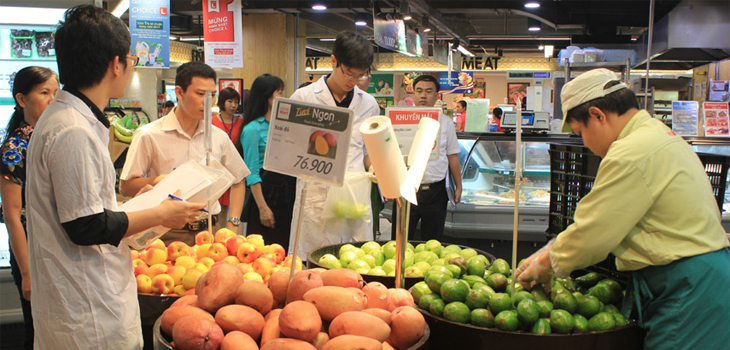The booming modern retail system has opened up huge opportunities for domestic suppliers. However, many domestic enterprises and suppliers are struggling to keep up with the strict requirements of this system, especially in terms of quality and delivery time.
Together Bizzi Find out details in the article below.
Index
ToggleDomestic suppliers "falter" before foreign "giants"
Vietnam's retail market is witnessing a strong boom in modern retail systems with more than 1,167 supermarkets, 254 shopping centers and thousands of convenience stores operating in a chain model. The growth rate of this system is up to 11.8%/year, opening up huge opportunities for domestic suppliers.
However, besides opportunities, domestic suppliers are also facing many big challenges, especially under competitive pressure from foreign supermarket giants such as LOTTE, Central Retail, Aeon...
Many domestic suppliers, despite having “stepped foot” into modern retail chains, are still struggling with the strict requirements on quality and delivery time of the “big guys”. Foreign supermarkets constantly complain about delayed deliveries, lack of goods or products that do not meet quality standards, affecting the reputation and development potential of domestic enterprises.
Specifically:
- Delayed delivery, product shortages: A shortage of goods on shelves makes supermarket systems unable to meet consumer needs, affecting reputation and revenue.
- Uneven product quality: Some domestic products have uncertain quality, affecting consumer health and the image of the supermarket system.
- The logistics system is not professional: The transportation of goods is not guaranteed, causing products to be damaged and reduce quality.
This forces supermarkets to switch to importing goods from abroad, leading to the risk of "losing ground" for domestic businesses in their own market.

“Weaknesses” that hinder the development of domestic suppliers
There are many reasons for the "struggling" situation of domestic suppliers in front of the modern retail system, including:
- Limited production capacity: Many domestic enterprises are still small in scale, have outdated equipment, and unadvanced production technology, leading to low productivity, uneven product quality, and not meeting requirements. strict requirements of modern retail systems.
- The management system is not professional: The management of production, warehousing, and transportation still has many inadequacies and lack of synchronization, leading to shortages of goods, delayed delivery, and affecting product quality.
- Weak financial capacity: Limited access to capital makes it difficult for domestic businesses to invest in technology, equipment and improve production capacity.
- Shortage of high-quality human resources: The need to recruit highly qualified workers in the manufacturing industry is increasing, but the supply is limited, leading to a shortage of human resources, affecting efficiency. business activities.
The consequences of not meeting the requirements of foreign supermarkets for domestic suppliers are extremely serious:
- Losing the opportunity to cooperate with modern supermarket chains means losing the opportunity to access a huge potential market.
- Loss of brand reputation due to delayed delivery, lack of goods or products of poor quality.
- Bearing penalty costs due to contract violations, directly affecting the financial situation of the business.
Risk of "losing ground" for domestic suppliers if not changed
If not improved in time, domestic suppliers will face the risk of losing ground to foreign suppliers. Supermarkets will be forced to switch to importing goods from abroad, leading to a decrease in market share for domestic products.
What solution for domestic suppliers?
To improve competitiveness and meet the strict requirements of the modern retail system, domestic suppliers need to focus on the following solutions:
- Upgrading production processes, innovating technology and improving operations: The application of advanced technology solutions such as automation and robotization will help optimize production processes, improve efficiency and quality. product quantity.
- Improve product design and quality: Businesses need to focus on market research and grasp consumer trends to produce products that meet consumer needs and tastes.
- Invest in logistics and logistics: An effective logistics and logistics system will help ensure on-time, complete delivery and intact product quality.
- Expand and improve capital sources: Access to capital will help businesses invest in technology, equipment and improve production capacity.
- Improve management capacity: Businesses need to build a professional, scientific, and synchronous management system from production, warehousing to transportation to ensure operational efficiency and improve product quality.
- Human resource development: Businesses need to focus on training and fostering skills for staff, while attracting high-quality human resources to meet development needs.
Besides the efforts of businesses, support policies from the Government also play an important role in promoting the development of the domestic manufacturing industry. Creating a favorable business environment and supporting access to capital and technology will help domestic businesses improve their competitiveness and affirm their position in the market.
The modern retail system is a great opportunity for domestic suppliers, but also a big challenge. To "break through" and affirm their position in the market, businesses need to proactively improve their competitiveness through technological innovation, improving product quality, professionalizing the management system, expanding the market and taking advantage of support from the Government.
With their efforts and determination, domestic suppliers can completely "catch up" with the trend, compete effectively and affirm their position in the market, contributing to the overall development of the country's economy.
Event exclusively for supermarket/retail chain suppliers: Overcoming the barrier of LACK OF CAPITAL
If domestic suppliers are in a state of "capital shortage" and cannot immediately solve the problems they are facing, join the Webinar "Overcoming the barrier of CAPITAL SHORTAGE" to share the secret:
- Update the latest trends in finance and supplier support solutions.
- Learn from experts and successful businesses.
- Find a suitable solution to solve the problem of capital shortage.
- Expand your network of connections and exchanges with experts and businesses in the industry.
Event information:
- Time: 15:00 – 16:30 on 24/07/2024
- Form: Online
Register for free: https://bom.so/thieuhutvon-event